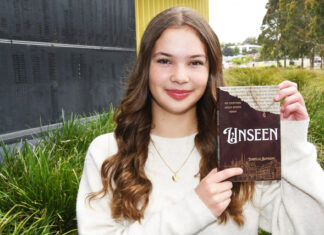By Melissa Meehan
LOCAL orchardists Marie and Chas Harding say fruit growers around the country feel betrayed by Prime Minister Julia Gillard following her speech to the New Zealand Parliament this month.
When Ms Gillard addressed New Zealand’s Parliament she said a promise to accept the ruling made by Trade Minister Craig Emerson would be delivered.
“Australia accepts the verdict of the global umpire and will implement the World Trade Organisation rulings on the importation of New Zealand apples to Australia,” she said, to loud applause.
In the first address by a foreign leader to New Zealand MPs in their debating chamber, Ms Gillard said Australia and New Zealand needed to reform and adapt while having fiscal discipline and an “unswerving commitment to free trade”. The Federal Government ordered an import risk analysis as a first step. Australian growers fear New Zealand imports could introduce fire blight disease.
Ms Harding said the announcement, made by the Prime Minster, was a surprise.
“After fighting imports for so many years there was definitely a surprise element to what she said,” Ms Harding said.
“There’s still a lot of work to be done before they should be allowed to come in.
“Ms Gillard’s comment – that is a little premature.”
Australian growers strongly believe that New Zealand apple imports must come with guarantees to minimise the risk of introducing of new pests or diseases.
They believe that importing fruit from New Zealand would place the entire pear industry and a significant proportion of the apple industry at risk.
Victoria grows about one-third of Australia’s Pink Lady variety – that also represents one-third of plantings and it is highly susceptible to fire blight.
Speaking from their Pakenham property Hardings Orchard, the Hardings said the main concern for growers was disease.
“Australia is one of the few countries that doesn’t have fire blight,” she said.
“Once it sets in that’s it – and fruit from China and especially New Zealand have these diseases.”
Last November the World Trade Organisation said Australia needed to accept apples and pears from other countries, Ms Harding said local growers understood this, but much work needed to be done in relation to protocol to protect the industry already set up here.
“I believe that people like local produce,” she said.
“But if these imports come in, without having to meet the requirements we do, with less wages than we pay – its just got to be a level playing field.”
Ms Harding said other growers felt betrayed by the Prime Minister’s comments, and felt that she was celebrating New Zealand apples while ignoring local growers.
“We try and grow quality produce,” she said.
“Hopefully these imports will need to meet the strict guidelines we have and people will continue to buy clean, green and Australian first.
“We just want it to be a fair and even playing field.”
Get the latest news to your email inbox FREE!
REGISTER




